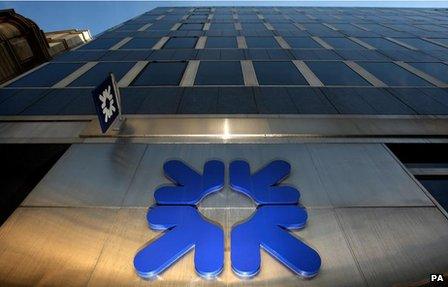Royal Bank's obstacle course
- Published

The deal to sell more than 300 Royal Bank of Scotland branches to Santander collapsed last week
Is Royal Bank of Scotland heading back to normality? Stephen Hester, the chief executive, thinks so, reckoning that next year could see it turn the corner.
He's just passed the four-year mark in his post, following his battlefield promotion on the day Fred Goodwin departed, taking his notorious pension with him.
Three days after Direct Line shares started trading on the London Stock Exchange, that helps make the case for the Hester recovery programme being on track.
At an offer price of 175p last week, the newly-floated general insurance firm was trading today at 189p. RBS still owns two-thirds of Direct Line, which it's being forced by the European Commission to sell off, both as punishment for having to seek state aid, and to try to inject more competition into Britain's banking.
Next important step: there are high expectations that RBS will this week announce that it's escaped the terms of the enforced insurance policy it was required to protect against possible losses on its toxic assets.
The Asset Protection Scheme has been costing it £500m per year, as a payment to the government to insure against losses on nearly £300bn of assets. Following a huge run-off of these assets, without any need to claim on the policy, the bank now reckons it's no longer necessary.
Fallen branches
However, there are still a number of obstacles in Mr Hester's way. One returned last week, in that another requirement of the European Commission ruling has gone awry.
The sale of 316 branches - mostly the RBS-branded ones in England and Wales, with five NatWest branches in Scotland - was meant to see them shift to Santander.
But in a testy exchange of briefings, the deal fell apart. It's either because RBS was delaying too long, particularly over the separation of IT systems, or because Santander has enough worries on its plate back at its Spanish base, and needed to bail out.
Another big worry for RBS is the Libor scandal, for which Barclays has already paid up £290m in fines. RBS has sacked staff for involvement in rigging inter-bank lending rates. It wasn't commenting on a report this week that a very senior trader was suspended over the issue last week. We don't yet know how wide or deep it goes. But it's near certain to cost RBS a lot, in cash and reputation.
Share value
Legal challenges also loom on the horizon. In the US, there's class action from shareholders suing because their stake's lost value.
And in London, lawyers are preparing to serve a writ on RBS and on three former directors - Fred Goodwin, Sir Tom McKillop and Johnny Cameron - for losses reckoned to be between £3bn and £4bn.
The claim is that Fred Goodwin, as chief executive, went for £12bn in Britain's biggest ever rights issue in April 2008 when, it is claimed, he and his fellow directors must have known there were significant problems with the bank's capital position but - again, allegedly - failed to disclose it.
Shareholders duly signed up to the rights issue, and by the end of that year, not only had the chief executive lost his job, but they'd lost about 90% of their shares' value.
Prolonged battle
In addition to around 90 institutional investors, the lawyers behind this action say that around 10,000 retail investors have signed up to the legal action so far. Scots form a large share of that, including RBS staff who say they were loaned money by the bank to subscribe to the rights issue. The lawyers were meeting some of them in Edinburgh last night, making the case for help in fund-raising for the case.
They are going to need to lodge millions with the London courts as a guarantee against legal costs if their case is lost. If that can be secured, expect to see a writ issued by Christmas.
Does RBS then want to go through a prolonged legal battle when it's trying to get back to normal, including possible disclosure of its internal documents from 2008? Or would it want to settle?
And if it loses or settles for anything up to £4bn, will it go after the former directors and its advisers to pay the bill?
I'm guessing that a Mr Goodwin of Edinburgh is particularly keen to find out.
A bit later: By astonishing coincidence, RBS announced on Wednesday that it was exiting the Asset Protection Scheme.
You can comment or follow Douglas Fraser on Twitter: @BBCDouglsFraser